Created by NewYorkSocialWorkEDU.org Contributing Writer
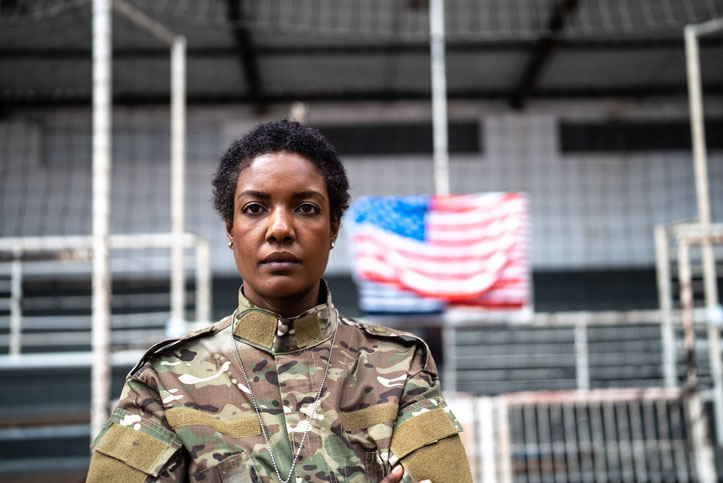
Military service brings a kind of discipline and clarity around mission that is remarkably useful in the world of social work. Training emphasizes flexibility, adaptability, and commitment… and it’s not surprising that those traits continue to come in handy when you shift your field of battle to the war on poverty, the fight for equality, and the clash with injustice.
On top of that, many members of the American military have already seen some of the worst impacts of disability, inequity, and injustice. Assigned to stations around the country and around the world, they come to the field of social work with a broader perspective than many of the fresh-faced youth starting a typical Bachelor of Social Work degree program.
Military recruitment draws disproportionately from disadvantaged socioeconomic communities and minority groups… exactly the groups that social workers serve.
The minority and lower-income groups that make up the bulk of enlistees rightly see the American military as an equal opportunity employer where hard work can unlock multiple benefits to getting ahead in society.
But that background can be a deficit when it comes to paying for college. You’re not coming out of the slice of the demographic pie that has parents who can cut a five figure tuition check without blinking. You may not have much savings to tap into after covering the bare necessities in life. You may not have a lot of examples in your life to show you what it looks like to get on the path to higher education.
Your Service Earned You the Financial Support it Takes to Earn a Degree and Become a Social Worker in New York
Fortunately, American service members can tap into some of the most generous tuition benefits available from any military in the world. And that’s a fast track to a position as a social worker in New York.
Just as you had to go through training and evaluation to become a qualified and competent soldier, sailor, airman, or Marine, you’re going to need to go through a series of qualifications in order to become a social worker in New York. It’s a multi-step process that will take years—but will add on to your innate qualities as a compassionate, capable veteran with the skills needed to deliver critical assistance to your clients.
Even if you are already discharged or on your way to civvy street soon, you will find services and programs for veterans designed to help you through nearly every step of that process.
How To Put Your Service Experience and Military Benefits To Work Earning Your Social Work Degree in New York
Your service will give you a lot of resources to help you along the way, but your path to become a New York social worker will involve all the same steps as anyone else seeking the position.
That means you will need to dig into all of the details of the steps outlined in our guide. But you can also put your unique resources to use at almost every one of those steps to help smooth that path and pave your way.
Getting a Jump on New York Social Work Careers While Still on Active Duty
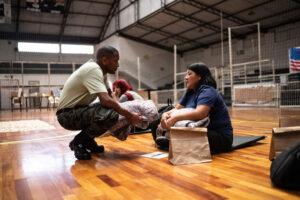 There’s no way to be a part of the modern American military and not come to understand the importance and value of planning. From Basic training to your last day before discharge, chances are there has been a Powerpoint presentation or rock drill covering nearly every move you’ve made.
There’s no way to be a part of the modern American military and not come to understand the importance and value of planning. From Basic training to your last day before discharge, chances are there has been a Powerpoint presentation or rock drill covering nearly every move you’ve made.
So there’s a good chance you are starting to develop a concept of action for your social work career well before you actually leave the service. And you can get help with that through TAP.
No one exits the American military these days without a transition plan courtesy of TAP, the mandatory Transition Assistance Program.
TAP pulls in resources from seven different federal agencies to help newly discharged vets find their footing in the civilian world. It includes mandatory counseling and benefits explanations, and can be a critical part of putting your social work career plan together in a way that maximizes assistance from Uncle Sam.
With that professional assistance, you’re in great shape to start taking the critical steps to becoming a social worker in New York with all the support you deserve.
1. Earn a Bachelor of Social Work (BSW) Using GI Bill® Benefits
The straightest path to a career in social work is through a Bachelor of Social Work (BSW) degree program. And your GI Bill® education benefits will cover the entire cost of in-state tuition at one of New York’s excellent public universities.
A BSW provides the kind of focused education that can prepare you for a lot of different kinds of careers in the field. But more than that – if you’re planning to go all the way by earning a New York social work license (LMSW or LCSW), then you’re ultimately aiming for a Master’s in Social Work (MSW).
Only a BSW can qualify you for advanced standing admission to an MSW program since it packs in all the social work curriculum you’d otherwise take in the first year of master’s studies. That means advanced-standing MSW programs let you earn a master’s in just one year, instead of two, saving not just time, but a considerable sum of money.
When earning a BSW, or even if you choose another major like psychology or human services (which don’t qualify for advanced-standing MSW enrollment), you’ll be relying on GI Bill benefits to cover the cost.
The GI Bill® is your big friend here, with the typical 36 months in benefits coming out as just enough to cover your full four-year bachelor’s degree.
If you are planning ahead, you can also make use of benefits you receive on active duty to cut down on the time it takes to earn your degree. Military Tuition Assistance can put you well on your way to earning a two-year associate degree while still in uniform. That can make it faster and less expensive for you to complete your BSW after you are discharged.
When It Comes To Getting an Education To Become a Social Worker in New York, GI Bill® Support Is Second to None
The GI Bill® has been putting veterans through schools since the Greatest Generation came home victorious from the Second World War. Today’s iteration, the Post-9/11 GI Bill® is more comprehensive and generous than ever.
Qualifications are simple. You must have:
- Served on active duty for at least 90 days after September 10, 2001
- Have a high school diploma or GED before applying
You may also qualify if you were wounded in action after September 11, 2001, or served for at least 30 days and honorably discharged with a service-related disability.
Data from the National Association of Social Workers and the Council on Social Work Education found that around four percent of MSW students are funded by the GI Bill® or other VA programs.
In return, with a standard 36 months of service or more behind you, you are eligible for:
- Full in-state tuition payments (or, if you are from outside New York, the college and the state may waive residency requirements) for 36 months of college attendance
- An annual $1,000 stipend for books and supplies
- A monthly housing allowance equivalent to E-5 Basic Allowance for Housing
- Relocation costs if you are moving from a rural area for school
What You Need to Know About the Forever GI Bill® and Montgomery GI Bill®
 The Forever GI Bill® Eliminated Time Limits on Education Benefits, Letting Vets Go Back to School When the Time is Right
The Forever GI Bill® Eliminated Time Limits on Education Benefits, Letting Vets Go Back to School When the Time is Right
The Forever GI Bill®, passed in 2017, removed time limits on using benefits and added eligibility for service members whose benefits were otherwise expiring.
The new provisions allow veterans discharged after 2013 to go back to school as nontraditional students whenever the time is right for them. And as it turns out, that’s likely to include a lot of would-be social workers.
The National Association of Social Workers and Council on Social Work Education have noted that around a quarter of all MSW grads in recent years have been an average of 40 years old.
It also added distance learning options for applying benefits, a real boost for students interested in online social work degree programs in New York.
The Montgomery GI Bill® is an Older and Less Popular Version, But Still the Option of Choice for Many
If that’s your cohort, it’s also more likely that you’re covered under the Montgomery GI Bill®. This was the version in effect prior to 9/11, and it remains available today.
MGIB, as it’s often called, is less generous in some ways than the Post-9/11 version, so only about 6% of veterans eligible for both choose the MGIB version. But it’s still the right option for many – about 130,000 choose to enroll in MGIB each year.
The MGIB pays a set amount monthly, so it’s sometimes preferred by working part-time students. And since it offers more coverage for exam fees, it could save you money on the ASWB exams required for LMSW and LCSW licensure in New York.
It’s also an option for veterans of the reserves.
Using Your Active Duty Supports To Start Your Education While Still in Uniform
There are additional benefits you can put toward your social work education while you are still on active duty.
The most significant of these is Military Tuition Assistance (MTA), available in every branch with certain variations.
MTA pays tuition toward a college program (undergrad or graduate) that you pursue on your own time during off-hours while on active duty. It will pay up to $250 per semester hour ranging up to a total of $4,500 per year in most branches. It’s a good way to get a jump start on your studies before you even get your DD-214.
This makes it possible to earn a complete associate degree before you are discharged, which can cut the time and cost of earning a bachelor’s degree in half once you’re a civilian. That not only speeds up your path to a social work career, but reduces the amount of the GI Bill® benefit you burn getting that degree.
And that’s a big deal when it comes to paying for your next step.
2. Military Education Benefits That Could Help You Earn a Master of Social Work (MSW)
If you play your cards just right, you may have some GI Bill® eligibility left to help pay for your master’s program. That means that you used MTA benefits while in the service and earned a two-year associate transfer degree while still active… then used about half your GI Bill® benefits to cover the second half of your bachelor’s after discharge.
If you were strategic enough with your benefits to do all this, you’d have approximately two years of benefits remaining, enough to cover the cost of your MSW.
And if you earned a BSW as your undergraduate degree and are going for a one-year Advanced Standing Master of Social Work program, you’re even more likely to be in good shape.
Even if you’re looking at an MSW at one of New York’s elite private universities, you’ve got options that can help reduce those costs enough for them to be covered under the GI Bill® by taking advantage of the Yellow Ribbon Program. Schools that participate in this program will cover the gap between your benefits and actual tuition costs.
New York’s Yellow Ribbon Social Work Schools Offer a Discount That Can Cover the Additional Cost of Attending a Private University or Out-of-State Tuition
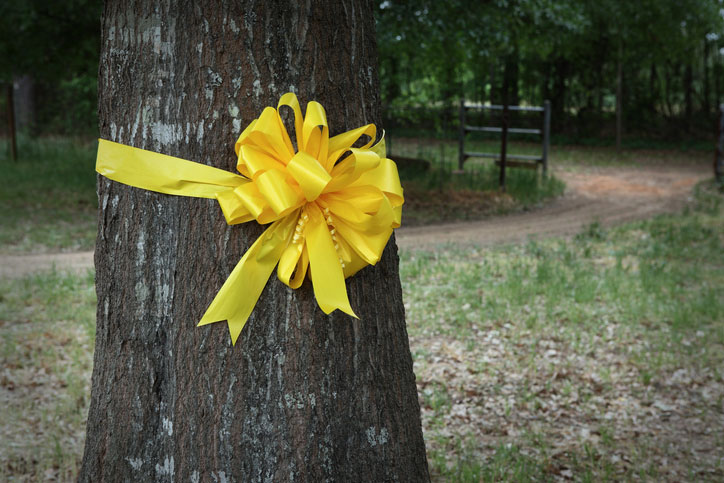
GI Bill® benefits are designed to cover the full cost of in-state tuition for four years of study (the typical bachelor’s) at any public university in America. But if you’re looking at out-of-state schools or more expensive private universities, those benefits leave a short-fall.
The Yellow Ribbon program offers a way around that limitation.
To be clear, most people use this benefit for their undergrad degree. But, again, if you are diligent about your education during service, you may have enough left over to apply toward graduate studies, and if so, the Yellow Ribbon program simply gives you more options – private universities and schools located out of state.
In cooperation with the VA, many schools in New York and around the country pledge to support veteran students from out-of-state by covering the difference between your GI Bill® benefits and the actual cost of tuition. In return, the VA picks up half that differential, so the school doesn’t eat the entire cost.
Schools With Social Work Programs in New York That Participate in the Yellow Ribbon Program
- Syracuse University
- SUNY Binghamton
- New York University
- Columbia University
- Adelphi University
- St. Joseph’s University
- Yeshiva University
- Fordham University
- Touro University
- SUNY Plattsburgh
- Iona University
- Dominican University
Because it is a draw on their resources, schools often cap the total number of Yellow Ribbon participants in attendance. You’ll want to work closely with advisors to ensure that there is space available for you if you plan to use the program.
Getting a Graduate Degree in Social Work While Still on Active Duty
There are genuine military service roles for social workers in the Army, Navy, and Air Force. For the most part, like other healthcare professionals, the services prefer to recruit individuals who have already earned their degree and qualified for the Licensed Clinical Social Worker (LCSW) license on their own dime.
But in the right circumstances, it’s possible for any service to decide they aren’t getting what they need from the outside, and they might start sending active duty applicants out to get that education.
Each service runs its own version of this program:
They are only open to officers, which means you’ll need to have already earned a bachelor’s degree and gotten a commission.
But it’s a sweet deal if you qualify. Not only does the service pick up the tab for your tuition, but you will continue to:
- Get paid the regular salary for your rank
- Have a basic housing allowance to cover room and board
- Have access to all your other military benefits, from the PX to healthcare
- Receive reimbursement for books and other school supplies
Usually, attending school through these programs means adding on to your service obligation, so it’s not a completely free deal. But upon discharge, you’ll have nothing between you and a New York social work career except for taking your licensing tests.
Veteran Readiness and Employment Assistance Levels the Playing Field for Disabled New York Veterans in Social Work Studies
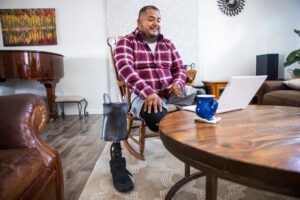 While the American military has gone to great lengths to protect armed services members that are put in harms way, it’s a business that comes with risk. And in every conflict, some of those who come home do so with injuries that will impact them throughout their lives.
While the American military has gone to great lengths to protect armed services members that are put in harms way, it’s a business that comes with risk. And in every conflict, some of those who come home do so with injuries that will impact them throughout their lives.
For disabled vets, additional assistance for school and job hunting is a debt they are owed. And the VA provides it through VR&E: Veteran Readiness and Employment.
VR&E only applies to vets who have a service-connected disability with a rating of at least 10 percent, and who did not receive a dishonorable discharge.
If that’s you, you may be given certain accommodations for physical barriers that make it difficult for you to attend classes. VR&E will also deliver counseling and may pay for your education, although you will have to choose between it and GI Bill® benefits.
But VR&E services also go beyond the GI Bill® when it comes time to actually find a job in social work. Employment counseling and assistance are also part of the package, which can make this a good fit for disabled vets going into social work in New York… a category where more lived experience is always welcome.
3. Get Additional Specialist Training in Identifying Child Neglect and Abuse/Apply for Licensure and Pass the Required License Examination
This is the part of the process where you are most on your own as a veteran becoming a social worker in New York.
New York requires a brief class to ensure every social worker can spot child abuse when working with this most vulnerable of population. It’s not a long process and not terribly expensive. But if you happen to have any eligibility left from your various other tuition assistance programs, it will likely go toward covering even this small expense.
Passing your license exam, however, is all on you. But with the commitment to training and dedication to mastering skills that comes with a military background, you could be the one acing the exam on your first try.
4. Get a Job and Build Experience Working in Social Services
Many social work jobs are found through government agencies, something that will work to your benefit as a veteran. That’s because both federal and New York State agencies have preferential hiring practices for military vets.
For New York State government jobs, you can apply through the state Department of Civil Service for temporary employment opportunities, or establish your eligibility for the Governor’s Program to Hire Veterans with Disabilities. Additionally, the New York State Department of Labor gives veterans priority service for all New York State employment and training programs.
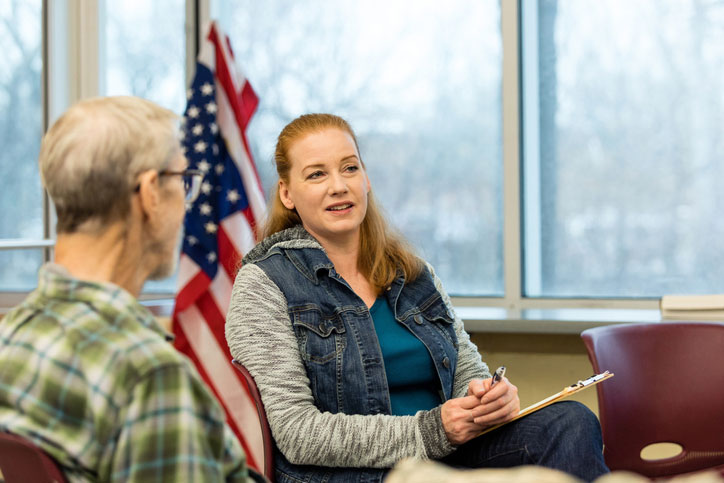
The state also has a Hire-A-Vet credit program for private businesses that encourages social services organizations outside of government to also offer vets jobs. Similarly, New York City’s Priority1 program helps connect veterans to employers who are committed to hiring them. Veteran specialists on staff at the city’s Workforce1 Career Centers will speak your language and get you in the right lane to get hired.
At the federal level, the VA itself is one of the major employers of social workers in the country, with more than 18,000 on the payroll. That makes them a heavyweight in New York as well. Most of those positions are eligible for veterans preference, shuffling your application to the top of the deck when resumes are being considered.
If you are interested in going into private practice social work, you will find programs to get your business certified as a Veteran-Owned or Service Disabled Veteran-Owned Business. This can help you land contracts with government agencies and other corporations that respect your service.
New York State Resources to Assist Veterans Studying Social Work
While we’ve focused on your federal options so far, New York state is at the forefront of helping veterans get educated and employed in all kinds of fields. New legislation passed as recently as 2023 shows legislators here are on the case when it comes to protecting veterans and securing your ability to get the job you deserve when you come home.
So on top of any GI Bill® benefits you have, it’s worth looking at what New York’s State Department of Veterans’ Services kicks in toward covering the costs of education in the Empire State. Their programs include:
- Military Residency Waiver for Higher Education Services awards - Active duty service members stationed here can have residency requirements waived for state-based scholarship money.
- Veterans Tuition Awards - New York’s Higher Education Services Corporation has scholarships available for both full and part-time veterans studying for degrees in the state.
- Military Service Deferments - You’re probably aware that you are on the hook for several years worth of reserve duty even after your discharge. But you might not have considered what happens to your student loan obligations if you're recalled to active duty. These deferments allow you to delay payments in the event you are mobilized again.
In New York, the Bureau of Veterans Education helps to ensure a quality education for all vets using GI Bill® education benefits. This serves as an extra check on schools here to make sure they meet all VA requirements, and means that using your state and federal benefits in New York is both safe and easy.
There’s one more state benefit that can give you a little relief here, though, and that’s the New York State Thruway Authority E-Z Pass for Disabled Vets program. Although only vets who have established eligibility for fee-exempt vehicle registration through the DMV qualify, it can be a solid savings if your education involves a commute.
VetSuccess on Campus Offers Counseling and Benefits Coordination Assistance

Your access to counselors with specific expertise in military and veteran benefits doesn’t necessarily end when you are mustered out. A program called VSOC, or VetSuccess On Campus, adopted by a number of New York colleges, puts military-focused counselors on campus for veterans to turn to when they run into questions that other advisors can’t answer.
VSOC is actually a part of the VR&E program that primarily caters to disabled veterans as outlined above. But you don’t have to be wounded or permanently disabled to tap into VSOC: it’s open to any veteran on any of the campuses where it is currently active.
So far, Syracuse University is the only New York university offering a social work degree that also has VSOC on campus, but the program is growing, so keep checking to see if it’s coming to your school.
Other Organizations and Resources for New York Veterans Entering the World of Social Work
On top of the official resources offered by city, state, and federal governments for vets in New York, you can take advantage of resources offered by other organizations dedicated to helping former service members launch their careers.
Vet Center Scholarship Program
The VA is a major employers of social workers as well as a supporter of veterans. So it’s no surprise that they have a scholarship program that is specific to social work and mental health counseling. In return for paying for up to two years of graduate studies in social work, you have to commit to serving full time for at least six years at a VA Vet Center in underserved areas or states with a high veteran population.
Wounded Warrior Project® Warriors to Work Program®
Wounded vets frequently need additional support when it comes to making the jump from well-supported academic studies to the actual full-time workforce. The Wounded Warrior Project® has made it their mission to help vets with that transition, offering career counseling, job placement programs, interview prep, and networking opportunities to get you to work in the social work community.
Student Veterans of America
As you’re making the transition from military to civilian life as a college student, it can be particularly hard to find your groove. Your level of maturity and experience is going to be well above most of your fellow students. It can be an isolating experience, where it feels like you have no one to turn to.
SVA is a national organization with almost 1,600 on-campus chapters that gives you that place to turn. Twenty-three of those chapters are in New York, including at these universities with social work programs:
- Touro College
- New York University
- Columbia University
- CUNY Hunter College
- Fordham University
One of the most important things that SVA does is simply connect you with a peer support group—people you can turn to who know where you are coming from and understand your values. But there are also resources that offer:
- Academic Advising and Success Coaching
- Career Coaching, including job boards and resume reviews
- Mentorship
- Scholarship funding
Of course, there are many other scholarship and funding opportunities available for New York social work students as well. Some of these are uniquely open to veterans, but you can qualify for others based on merit, ethnic or financial status, or other criteria.
At every step, you’ll find that having served your country will also make it easier to serve your community. Just as your nation’s military was glad to have you, you’ll find that the government and citizens of New York will be just as grateful you have come here to help them as a social worker.
